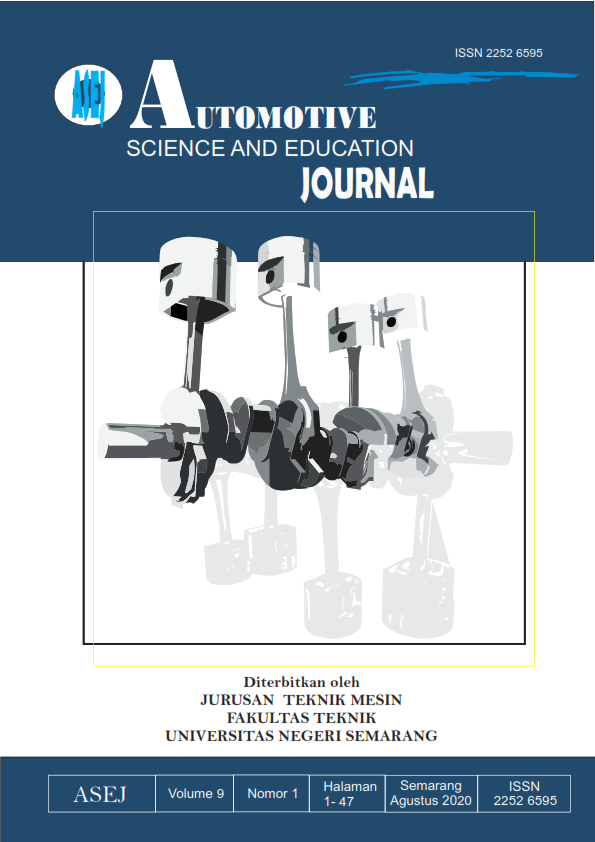PENGARUH INHIBITOR NATRIUM KROMAT TERHADAP LAJU KOROSI PADA KOMPONEN RADIATOR SISTEM PENDINGIN MOBIL
Main Article Content
Abstract
Radiator is one of the engine cooling system components that has leakage problems due to corrosion. The leakage in the cooling system can cause bad effects namely overheating. This study aims to find out the effect of sodium chromate inhibitors (Na2CrO4) can reduce the corrosion rate of car radiator components and find out the type of corrosion that occurs in car radiator components in aquades environment. The research method used is a real experiment. The corrosion testing was conducted by specimens immersing from aluminum radiators. The specimen was immersed in distilled water solution with variations in the addition of sodium chromate inhibitors of 0%, 0.3%, 0.5% and 0.7%. The micro photo testing used an optical microscope to determine the type of corrosion. The analysis in this study is descriptive statistical analysis. The results of this study indicated of the corrosion rate of aluminum in an aquades environment without inhibitors is 0.0084 mmpy. Meanwhile the corrosion rate of aluminum decreased with the addition of sodium chromate inhibitors (0.3% by 0.0053 mmpy, 0.5% by 0.0051 mmpy and 0.7% by 0.0043 mmpy). Thus the use of sodium chromate inhibitors can extend the life / time of using aluminum radiators. While the type of corrosion that occurs is pitting corrosion.
Article Details
Proposed Creative Commons Copyright Notices
1. Proposed Policy for Journals That Offer Open Access
Authors who publish with this journal agree to the following terms:
- Authors retain copyright and grant the journal right of first publication with the work simultaneously licensed under a Creative Commons Attribution License that allows others to share the work with an acknowledgement of the work's authorship and initial publication in this journal.
- Authors are able to enter into separate, additional contractual arrangements for the non-exclusive distribution of the journal's published version of the work (e.g., post it to an institutional repository or publish it in a book), with an acknowledgement of its initial publication in this journal.
- Authors are permitted and encouraged to post their work online (e.g., in institutional repositories or on their website) prior to and during the submission process, as it can lead to productive exchanges, as well as earlier and greater citation of published work (See The Effect of Open Access).
Proposed Policy for Journals That Offer Delayed Open Access
Authors who publish with this journal agree to the following terms:
- Authors retain copyright and grant the journal right of first publication, with the work [SPECIFY PERIOD OF TIME] after publication simultaneously licensed under a Creative Commons Attribution License that allows others to share the work with an acknowledgement of the work's authorship and initial publication in this journal.
- Authors are able to enter into separate, additional contractual arrangements for the non-exclusive distribution of the journal's published version of the work (e.g., post it to an institutional repository or publish it in a book), with an acknowledgement of its initial publication in this journal.
- Authors are permitted and encouraged to post their work online (e.g., in institutional repositories or on their website) prior to and during the submission process, as it can lead to productive exchanges, as well as earlier and greater citation of published work (See The Effect of Open Access).
